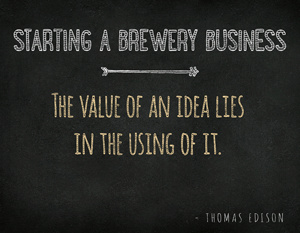How many times have you spent sipping on a cold pint of the dark stuff with your friends when one of them, after finishing his third beer, has an epiphany: “Dude, we should totally start our own brewery…I mean how hard can it be?” Although your kind-hearted friend’s idea sounds good at the time, what he doesn’t know is that starting a brewery is no easy task. Navigating the laws and regulations alone would send most people running for the hills. However, there are some of you out there with the drive and passion for good beer and a determination to bring these tasty suds to the masses. So for those who’ve made it this far into my article, below I’ll outline the different types of licenses need to start a brewery in Michigan.
While breweries are regulated under both state and federal laws, for the purposes of this article I’ll just touch in the Michigan specific requirements. Michigan law allows a brewer to operate under either a brewer’s, brewpub or micro-brewery license.
Brewery License
A brewery license permits manufacturing an unlimited quantity of beer. Brewers may sell the beer they produce to licensed wholesalers, but many not sell directly to retailers. A brewer may also sell the beer it produces to consumers for on-premise consumption at only one brewing facility in Michigan, but it may sell beer that it produces at all of its facilities for off-premises consumption. Sampling of beer in a hospitality room located on the brewery premises is also permitted.
Micro-Brewery License
A micro-brewery license permits manufacturing of up to 60,000 barrels of beer annually (which includes any out-of-state production). Micro-brewers may sell beer to licensed wholesalers, but not directly to retailers. Micro-breweries that produce 30,000 barrels or less per year may sell directly to consumers for on and off-premise consumption without an additional license. Sampling of beer on the brewery premises is permitted.
Brewpub License
A brewpub license permits manufacturing up to 18,000 barrels of beer annually. In addition to a brewpub license, a brewpub must also hold an on-premise license (Class C, Tavern, A-Hotel, B-Hotel or Resort). The brewpub must operate a full service restaurant with at least 25% of gross sales coming from non-alcoholic items. Brewpubs may not sell their beer to wholesalers or retailers, but may sell their beer to consumers for on or off-premises consumption.
Key Differences between Licenses
The key differences between a brewer’s, micro-brewery and brewpub license are the amount of beer the establishment can produce, restaurant requirements and restrictions, and limitations on to whom you can sell.
Specifically, whereas a brewer’s license authorizes the production of an infinite amount of beer, a micro-brewery license restricts production to 60,000 barrels per year and a brewpub license restricts production to 18,000 barrels per year. While a brewery or micro-brewery may be allowed to have a restaurant on its premises, a brewpub license requires the brewer to operate a restaurant on its premises. No license permits the sale of beer directly to retailers and only breweries and micro-breweries may sell to wholesalers.
It is important to note that local regulations may further restrict your operations, such as stricter closing hours than state requirements. Thus, it is critical to research and understand the local ordinances prior to choosing a location. If you need assistance in establishing or navigating the laws and regulations that effect your brewery, please contact us at Morsel Law.

